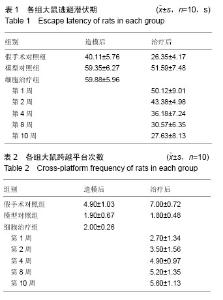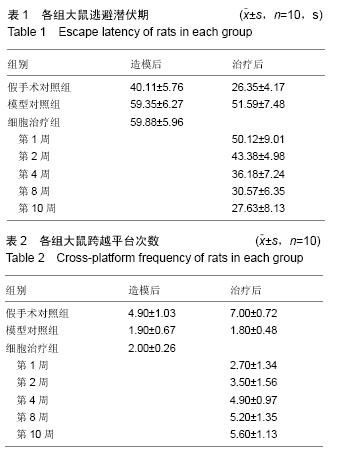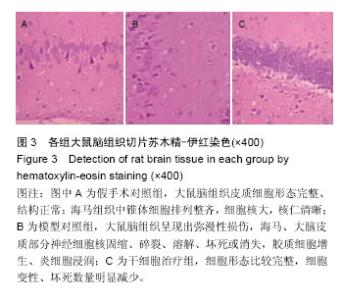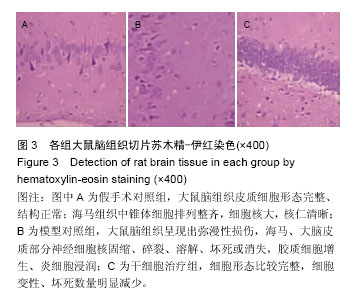Chinese Journal of Tissue Engineering Research ›› 2016, Vol. 20 ›› Issue (36): 5371-5377.doi: 10.3969/j.issn.2095-4344.2016.36.008
Previous Articles Next Articles
Bone marrow mesenchymal stem cell transplantation improves behavior performance of senile dementia rats
Zhang Ying, Guo Jian-hua, Yan Hong-juan, Luo Qiu-hua, Li Xin-ping, Guo Wei, Wang Hai-xia
- Second Department of Geriatrics, First Hospital of Handan, Handan 056000, Hebei Province, China
-
Revised:2016-06-23Online:2016-09-02Published:2016-09-02 -
About author:Zhang Ying, Associate chief physician, Second Department of Geriatrics, First Hospital of Handan, Handan 056000, Hebei Province, China -
Supported by:the Medical Research Project of Hebei Province, No. 20130921
CLC Number:
Cite this article
Zhang Ying, Guo Jian-hua, Yan Hong-juan, Luo Qiu-hua, Li Xin-ping, Guo Wei, Wang Hai-xia . Bone marrow mesenchymal stem cell transplantation improves behavior performance of senile dementia rats[J]. Chinese Journal of Tissue Engineering Research, 2016, 20(36): 5371-5377.
share this article
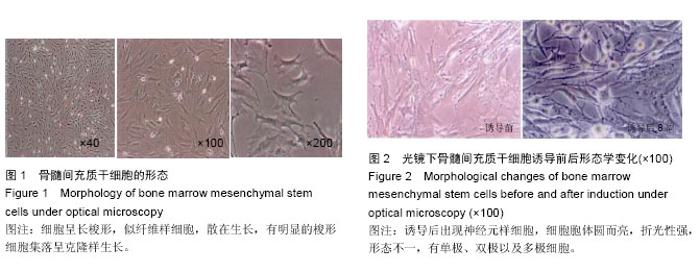
2.1 骨髓间充质干细胞培养及诱导分化结果 用标准细胞培养液培养骨髓单个核细胞,24 h后有少量细胞贴壁,48 h后贴壁细胞数目明显增多,细胞呈圆形或长梭形。在培养的前3 d细胞集落由1个或几个细胞组成,细胞增殖较慢,细胞数变化不明显。培养5-7 d细胞开始迅速增殖,细胞形态出现较大变化,可见纺锤形和星形多突起的细胞贴壁生长。当细胞生长至80%-90%融合时进行消化传代。传代后的细胞生长增殖迅速,1周内即可达到完全融合。随着换液传代次数的增加,未贴壁细胞逐渐减少,细胞形态变得较为一致,细胞呈长梭形,可散在生长,有明显的梭形细胞集落呈克隆样生长,逐渐纯化,见图1。 通过体外诱导分化,出现神经元样细胞,胞体圆而亮,折光性强,形态不一,有简单的单极、双极细胞,也有多极细胞,见图2。"
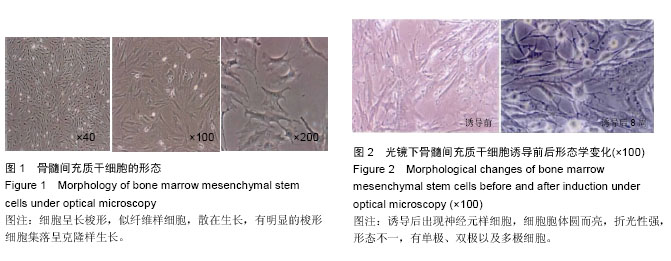
| [1] Howard KL, Filley CM. Advances in genetic testing for Alzheimer's disease. Rev Neurol Dis. 2009;6(1):26-32. [2] Park D, Yang YH, Bae DK, et al. Improvement of cognitive function and physical activity of aging mice by human neural stem cells over-expressing choline acetyltransferase. Neurobiol Aging. 2013;34(11): 2639-2646. [3] Miller RH, Bai L, Lennon DP, et al. The potential of mesenchymal stem cells for neural repair. Discov Med. 2010;9(46):236-242. [4] Deng YB, Ye WB, Hu ZZ, et al. Intravenously administered BMSCs reduce neuronal apoptosis and promote neuronal proliferation through the release of VEGF after stroke in rats. Neurol Res. 2010;32(2): 148-156. [5] Andres RH, Horie N, Slikker W, et al. Human neural stem cells enhance structural plasticity and axonal transport in the ischaemic brain. Brain. 2011;134(Pt 6): 1777-1789. [6] Delcroix GJ, Garbayo E, Sindji L, et al. The therapeutic potential of human multipotent mesenchymal stromal cells combined with pharmacologically active microcarriers transplanted in hemi-parkinsonian rats. Biomaterials. 2011;32(6):1560-1573. [7] Si L, Xu T, Wang F, et al. X-box-binding protein 1-modified neural stem cells for treatment of Parkinson's disease. Neural Regen Res. 2012;7(10):736-740. [8] 孙治坤,陈生弟.阿尔茨海默病的治疗[J].上海交通大学学报,2008,28(5): 596-599. [9] Matsuoka Y, Jouroukhin Y, Gray AJ, et al. A neuronal microtubule-interacting agent, NAPVSIPQ, reduces tau pathology and enhances cognitive function in a mouse model of Alzheimer's disease. J Pharmacol Exp Ther. 2008;325(1):146-153. [10] Srivareerat M, Tran TT, Alzoubi KH, et al. Chronic psychosocial stress exacerbates impairment of cognition and long-term potentiation in beta-amyloid rat model of Alzheimer's disease. Biol Psychiatry. 2009;65(11):918-926. [11] Calabrese B, Shaked GM, Tabarean IV, et al. Rapid, concurrent alterations in pre- and postsynaptic structure induced by naturally-secreted amyloid-beta protein. Mol Cell Neurosci. 2007;35(2):183-193. [12] Mahmood A, Lu D, Lu M, et al. Treatment of traumatic brain injury in adult rats with intravenous administration of human bone marrow stromal cells. Neurosurgery. 2003;53(3):697-702. [13] 袁章,杨拯,徐艳,等.骨髓间充质干细胞向神经元样细胞分化及其在神经修复中的应用[J].中国康复医学杂志,2009, 24(8):766-769. [14] Hwang DH, Shin HY, Kim BG.Fortuitous benefits of activity-based rehabilitation in stem cell-based therapy for spinal cord repair:enhancing graft survival. Neural Regen Res. 2015; 10 (10): 1589-1590. [15] Yin Y, Zhou X, Guan X, et al.In vivo tracking of human adipose-derived stem cells labeled with ferumoxytol in rats with middle cerebral artery occlusion by magnetic resonance imaging. Neural Regen Res. 2015; 10(6): 909-915. [16] Yu HB,Chen PD,Yang ZX,et al.Electro-acupuncture at Conception and Governor vessels and transplantation of umbilical cord blood-derived mesenchymal stem cells for treating cerebral ischemia/reperfusion injury. Neural Regen Res. 2014;9(1): 84-91. [17] Cho SR, Kim YR, Kang HS, et al. Functional recovery after the transplantation of neurally differentiated mesenchymal stem cells derived from bone barrow in a rat model of spinal cord injury. Cell Transplant. 2009; 18(12):1359-1368. [18] Dezawa M,Kanno H,Hoshino M,et al.Specific induction of neuronal cells from bone marrow stromal cells and application for autologous transplantation.J Clin Invest. 2004;113(12):1701. [19] 乔之龙,郭蕾,李菲.补肾益智汤对老年痴呆模型大鼠中枢神经递质的影响[J].中华中医药学刊,2009,27(12):2565- 2568. [20] 吴斌,吴永超,郑启新,等.骨髓基质干细胞在IKVAV多肽纳米纤维凝胶表面增殖、黏附及向神经细胞诱导分化的研究[J].中华创伤骨科杂志,2007,9(8):740-744. [21] Le Blanc K, Ringdén O. Immunobiology of human mesenchymal stem cells and future use in hematopoietic stem cell transplantation. Biol Blood Marrow Transplant. 2005;11(5):321-334. [22] Biswas SC, Shi Y, Vonsattel JP, et al. Bim is elevated in Alzheimer's disease neurons and is required for beta-amyloid-induced neuronal apoptosis. J Neurosci. 2007;27(4):893-900. [23] Yoshimura H, Muneta T, Nimura A, et al. Comparison of rat mesenchymal stem cells derived from bone marrow, synovium, periosteum, adipose tissue, and muscle. Cell Tissue Res. 2007;327(3):449-462. [24] Huang JI, Kazmi N, Durbhakula MM, et al. Chondrogenic potential of progenitor cells derived from human bone marrow and adipose tissue: a patient-matched comparison. J Orthop Res. 2005; 23(6):1383-1389. [25] Corcione A, Benvenuto F, Ferretti E, et al. Human mesenchymal stem cells modulate B-cell functions. Blood. 2006;107(1):367-372. [26] Nauta AJ, Fibbe WE. Immunomodulatory properties of mesenchymal stromal cells. Blood. 2007;110(10): 3499-3506. [27] Krampera M, Glennie S, Dyson J, et al. Bone marrow mesenchymal stem cells inhibit the response of naive and memory antigen-specific T cells to their cognate peptide. Blood. 2003;101(9):3722-3729. [28] Di Nicola M, Carlo-Stella C, Magni M, et al. Human bone marrow stromal cells suppress T-lymphocyte proliferation induced by cellular or nonspecific mitogenic stimuli. Blood. 2002;99(10):3838-3843. [29] Spaggiari GM, Capobianco A, Becchetti S, et al. Mesenchymal stem cell-natural killer cell interactions: evidence that activated NK cells are capable of killing MSCs, whereas MSCs can inhibit IL-2-induced NK-cell proliferation. Blood. 2006;107(4):1484-1490. [30] Zhang W, Ge W, Li C, et al. Effects of mesenchymal stem cells on differentiation, maturation, and function of human monocyte-derived dendritic cells. Stem Cells Dev. 2004;13(3):263-271. [31] Beyth S, Borovsky Z, Mevorach D, et al. Human mesenchymal stem cells alter antigen-presenting cell maturation and induce T-cell unresponsiveness. Blood. 2005;105(5):2214-2219. [32] Aggarwal S, Pittenger MF. Human mesenchymal stem cells modulate allogeneic immune cell responses. Blood. 2005;105(4):1815-1822. [33] Suvà ML, Riggi N, Stehle JC, et al. Identification of cancer stem cells in Ewing's sarcoma. Cancer Res. 2009;69(5):1776-1781. [34] Karnoub AE, Dash AB, Vo AP, et al. Mesenchymal stem cells within tumour stroma promote breast cancer metastasis. Nature. 2007;449(7162):557-563. [35] Ramasamy R, Lam EW, Soeiro I, et al. Mesenchymal stem cells inhibit proliferation and apoptosis of tumor cells: impact on in vivo tumor growth. Leukemia. 2007; 21(2):304-310. [36] Cho JS, Park HW, Park SK, et al. Transplantation of mesenchymal stem cells enhances axonal outgrowth and cell survival in an organotypic spinal cord slice culture. Neurosci Lett. 2009;454(1):43-48. [37] 黄洁萍,翁金森,王锋,等.骨髓间充质干细胞移植对急性脊髓损伤大鼠神经功能恢复及Nogo-A 表达的影响[J].中国康复医学杂志,2009,24(7):582-586. [38] Zheng XR, Zhang SS, Yin F, et al. Neuroprotection of VEGF-expression neural stem cells in neonatal cerebral palsy rats. Behav Brain Res. 2012;230(1): 108-115. [39] Araki T, Kato H, Kogure K. Selective neuronal vulnerability following transient cerebral ischemia in the gerbil: distribution and time course. Acta Neurol Scand. 1989;80(6):548-553. [40] Bartsch T, Schönfeld R, Müller FJ, et al. Focal lesions of human hippocampal CA1 neurons in transient global amnesia impair place memory. Science. 2010;328 (5984):1412-1415. [41] 柯尊记.老年学习记忆减退的神经行为学基础[J].生理科学进展,1997,28(4): 328-330. [42] Perez-Cruz C, Nolte MW, van Gaalen MM, et al. Reduced spine density in specific regions of CA1 pyramidal neurons in two transgenic mouse models of Alzheimer's disease. J Neurosci. 2011;31(10): 3926-3934. [43] Li Y, Yu X, Lin S, et al. Insulin-like growth factor 1 enhances the migratory capacity of mesenchymal stem cells. Biochem Biophys Res Commun. 2007; 356(3):780-784. |
| [1] | Zhang Tongtong, Wang Zhonghua, Wen Jie, Song Yuxin, Liu Lin. Application of three-dimensional printing model in surgical resection and reconstruction of cervical tumor [J]. Chinese Journal of Tissue Engineering Research, 2021, 25(9): 1335-1339. |
| [2] | Hou Jingying, Yu Menglei, Guo Tianzhu, Long Huibao, Wu Hao. Hypoxia preconditioning promotes bone marrow mesenchymal stem cells survival and vascularization through the activation of HIF-1α/MALAT1/VEGFA pathway [J]. Chinese Journal of Tissue Engineering Research, 2021, 25(7): 985-990. |
| [3] | Liang Xueqi, Guo Lijiao, Chen Hejie, Wu Jie, Sun Yaqi, Xing Zhikun, Zou Hailiang, Chen Xueling, Wu Xiangwei. Alveolar echinococcosis protoscolices inhibits the differentiation of bone marrow mesenchymal stem cells into fibroblasts [J]. Chinese Journal of Tissue Engineering Research, 2021, 25(7): 996-1001. |
| [4] | Geng Yao, Yin Zhiliang, Li Xingping, Xiao Dongqin, Hou Weiguang. Role of hsa-miRNA-223-3p in regulating osteogenic differentiation of human bone marrow mesenchymal stem cells [J]. Chinese Journal of Tissue Engineering Research, 2021, 25(7): 1008-1013. |
| [5] | Lun Zhigang, Jin Jing, Wang Tianyan, Li Aimin. Effect of peroxiredoxin 6 on proliferation and differentiation of bone marrow mesenchymal stem cells into neural lineage in vitro [J]. Chinese Journal of Tissue Engineering Research, 2021, 25(7): 1014-1018. |
| [6] | Zhu Xuefen, Huang Cheng, Ding Jian, Dai Yongping, Liu Yuanbing, Le Lixiang, Wang Liangliang, Yang Jiandong. Mechanism of bone marrow mesenchymal stem cells differentiation into functional neurons induced by glial cell line derived neurotrophic factor [J]. Chinese Journal of Tissue Engineering Research, 2021, 25(7): 1019-1025. |
| [7] | Pei Lili, Sun Guicai, Wang Di. Salvianolic acid B inhibits oxidative damage of bone marrow mesenchymal stem cells and promotes differentiation into cardiomyocytes [J]. Chinese Journal of Tissue Engineering Research, 2021, 25(7): 1032-1036. |
| [8] | Wang Shiqi, Zhang Jinsheng. Effects of Chinese medicine on proliferation, differentiation and aging of bone marrow mesenchymal stem cells regulating ischemia-hypoxia microenvironment [J]. Chinese Journal of Tissue Engineering Research, 2021, 25(7): 1129-1134. |
| [9] | Zeng Yanhua, Hao Yanlei. In vitro culture and purification of Schwann cells: a systematic review [J]. Chinese Journal of Tissue Engineering Research, 2021, 25(7): 1135-1141. |
| [10] | Xu Dongzi, Zhang Ting, Ouyang Zhaolian. The global competitive situation of cardiac tissue engineering based on patent analysis [J]. Chinese Journal of Tissue Engineering Research, 2021, 25(5): 807-812. |
| [11] | Chen Junyi, Wang Ning, Peng Chengfei, Zhu Lunjing, Duan Jiangtao, Wang Ye, Bei Chaoyong. Decalcified bone matrix and lentivirus-mediated silencing of P75 neurotrophin receptor transfected bone marrow mesenchymal stem cells to construct tissue-engineered bone [J]. Chinese Journal of Tissue Engineering Research, 2021, 25(4): 510-515. |
| [12] | Wu Zijian, Hu Zhaoduan, Xie Youqiong, Wang Feng, Li Jia, Li Bocun, Cai Guowei, Peng Rui. Three-dimensional printing technology and bone tissue engineering research: literature metrology and visual analysis of research hotspots [J]. Chinese Journal of Tissue Engineering Research, 2021, 25(4): 564-569. |
| [13] | Chang Wenliao, Zhao Jie, Sun Xiaoliang, Wang Kun, Wu Guofeng, Zhou Jian, Li Shuxiang, Sun Han. Material selection, theoretical design and biomimetic function of artificial periosteum [J]. Chinese Journal of Tissue Engineering Research, 2021, 25(4): 600-606. |
| [14] | Liu Fei, Cui Yutao, Liu He. Advantages and problems of local antibiotic delivery system in the treatment of osteomyelitis [J]. Chinese Journal of Tissue Engineering Research, 2021, 25(4): 614-620. |
| [15] | Li Xiaozhuang, Duan Hao, Wang Weizhou, Tang Zhihong, Wang Yanghao, He Fei. Application of bone tissue engineering materials in the treatment of bone defect diseases in vivo [J]. Chinese Journal of Tissue Engineering Research, 2021, 25(4): 626-631. |
| Viewed | ||||||
|
Full text |
|
|||||
|
Abstract |
|
|||||
